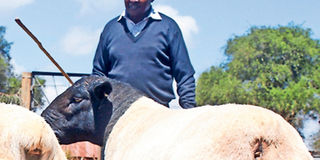Why I keep the Dorper sheep and not any other animal

Paul Nagisikie attends to his dorper sheep in Sultan Hamud. Dorper sheep are able to thrive in various climatic conditions. PHOTO | PIUS MAUNDU | NMG
What you need to know:
- The farmer started restocking his farm with Red Maasai sheep, buying one every market day.
- A rancher in Machakos introduced him to Dorper sheep in 1994, and having gathered breeding tips from the farmer, Nagisikie started to cross Dorper with the Red Maasai.
- They are able to produce up to 40kg of tender meat within six months
Tucked in the heart of Erankau village, some 6km from Sultan Hamud market, is the homestead of Paul Nagisikie.
The home is dotted with Dorper sheep, which the farmer keeps for their highly sought-after meat.
“Though I inherited 21 cows and 57 goats, the animals were wiped out by a drought that hit our area in 1978,” says the Nagisikie, 62.
The farmer started restocking his farm with Red Maasai sheep, buying one every market day.
“Then I was the only one who was keeping sheep, whose meat was on high demand. Those seeking rams from me to slaughter for their lactating women had to offer bulls in exchange," he recalls, adding that in 1989, he bagged 100 bulls from his sheep.
A rancher in Machakos introduced him to Dorper sheep in 1994, and having gathered breeding tips from the farmer, Nagisikie started to cross Dorper with the Red Maasai.
He has since phased out the Red Maasai completely, and his Dorper rams are a highly sought breeding stock.
"Ewes go for Sh25,000 while a ram for Sh45,000," he says, adding that he sells 40 sheep per month on average to Farmers’ Choice.
Dorper Sheep Breeders Society of Kenya treasurer Jeremiah Sein notes that the animal easily beats all other breeds because it grows faster and its meat is tender and delicious.
“They are able to produce up to 40kg of tender meat within six months,” he says, adding that explains the popularity of the breed to commercial farmers.
Dorper sheep are able to thrive in various climatic conditions because they adapt well, according to Sein.
However, they are at home mostly in arid and semi-arid areas.
Thanks to the sheep, Nagisikie has since acquired several properties, among them an entire building in Sultan Hamud market that houses the shop, which he once rented, and his children attend international schools.
Activities he undertakes to take care of the sheep include vaccination, deworming, dipping and shearing.





